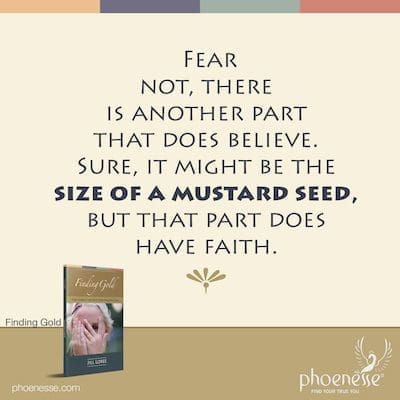So many of us are sincere in our desire for spiritual development. But our faith is not whole. There’s this little smidge of doubt that says: “Is this really true? Am I not just making all this up?” What do we do with this?
Job one is never going to be: push that aside. Such avoidance is done with the very best of intentions. We just don’t want to have these doubts. We hope that if we ignore them, they will go away. This whole idea that we can stuff things into our unconscious to make them go away is the genesis of most of the hurt in our lives. So no, not a good plan.
But we’re worried. If these doubts keep surfacing and hanging around, they will steer us off the road. We are going to fail in our spiritual endeavors, whatever they might be.

The root of our trouble here is all-or-nothing thinking. We are not aware that the doubting part is just that—a part. There is a greater whole and it is full of contradictory currents. So fear not, there is another part that does believe. Sure, it might be the size of a mustard seed. But that part does have faith.
The way out is by owning all our parts. The sooner we can let the negative parts have a place at the table, the better it will be for us. This keeps those immature parts from sitting off in the corner—because let’s face it, like it or not, they are in the room—and picking fights with their sisters. But it takes courage to acknowledge the parts we don’t like to own.
It is through God’s grace that we can come to understand this principle that we are all made up of contradictory, simultaneous currents. We need to have some humility about our own lack of complete faith. And we need to say to ourselves: “The willing part of me wants to develop and mature so that I can handle life better and help others more. I am not the judge of what I deserve, and with my half-faith, I will wait patiently and humbly until the grace of God is given.”
Experiencing God’s grace for ourselves is the doorway that leads to complete faith. This cannot be given to us from anyone else. And we can’t transmit this to others who are still battling to find their own faith. We each must do this part of the work on our own.

But be careful here. There’s a second aspect about faith that we need to know: complete faith is a misnomer. Every impurity in a person’s soul affects the completeness of faith. Perfect faith, then, means perfect people. Ain’t going to happen.
That said, some have much more faith than others, which can lead to a feeling that one is something special to God, a favorite child. This is dangerous and potentially quite harmful. Because there is a ton of pride here and it is oh so very easy to deceive oneself.
Sure, it would seem this is an expression of one’s devotion and spirituality. And yes, there are good and pure motives here, including the desire to come near to God and to love him. But mingled in are bad and impure things—spiritual pride and a feeling that we rate higher than others in the eyes of God.
This feeling of being special is an in-between state in spiritual development. It’s just one’s longing and love for God waking up faster than pride and self-will are leaving. Two opposite trends in one temporary state. It’s real but it’s not right or good. And it’s a normal part of the growing-up, self-knowing process.
So if a feeling of being special applies to us, even if only in some small degree, we have some work to do. Because such people who feel specially loved by God are often particularly intolerant of others. It may not show up outwardly, but it’s there in an inner attitude. Here’s something to try, perhaps in meditation. Choose someone you don’t respect, or better yet, someone you really like least of all the people you know—someone who really irritates you. Now think about how very much God also loves this person. Just as much as God loves you. Even if they are spiritually less developed—even if by a lot—they are still loved by God. Good medicine for a prideful soul.

We humans are complicated pieces of machinery, and the work of overcoming faults is a big deal. It takes time and a lot of effort. Even though our ultimate goal is perfection, our immediate goal is knowing and accepting ourselves as we are. This leaves no room for illusions about who we are. We need to gain healthy attitudes about our shortcomings and learn to live by life’s rules. No shortcuts and no skirting away from difficulties. That’s what we’re here to learn.
In this way, we’ll rewire some of our wrong currents and in doing so begin to react differently. We need to clarify our motives and clean them up, teasing out the bad from the good, and at the same time, letting them all be here. That’s our task.
We’re good people and we want to become better, to do better. We can’t afford to give up because our faith is lacking. During the times when we’re not feeling sure that God exists, we may just need to keep going for the love of others.
Know too that there will be a quiz. Don’t freeze—that’s just the way it is with life. Ironically, it’s when tests come—and come they must—that our view of things gets the most distorted. We get paralyzed, convinced that our negative way of seeing things is the only truth. And then we despair. What’s paralyzing us are the dark forces we have drawn to ourselves, keeping us from thinking and seeing what we would otherwise sort out quite readily.
It doesn’t even occur to us to ask for help—to pray to know the truth. We get too encased in our thoughts for even that. And then later, we come out of the darkness, and we are aghast that we could have been so blind. We can save ourselves some trouble by learning to turn to God: “Dear God, help me to see clearly, even though I’m a confused, mixed-up mess in the moment. Help me to see the truth in this situation, remembering what I already know but have forgotten and cannot see right now with my limited outlook.”
Our best weapon for fighting such temporary blindness is to train our thoughts to delve into our own unconscious—that part where we put the stuff we wanted to forget. This type of training makes us better prepared for sailing through future tests with self-acceptance and self-respect.
Return to Finding Gold Contents
Read Original Pathwork® Lecture: #33 Occupation with Self – Right and Wrong Faith


